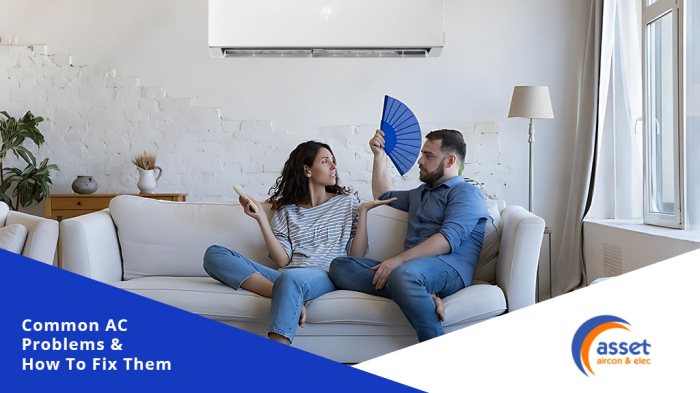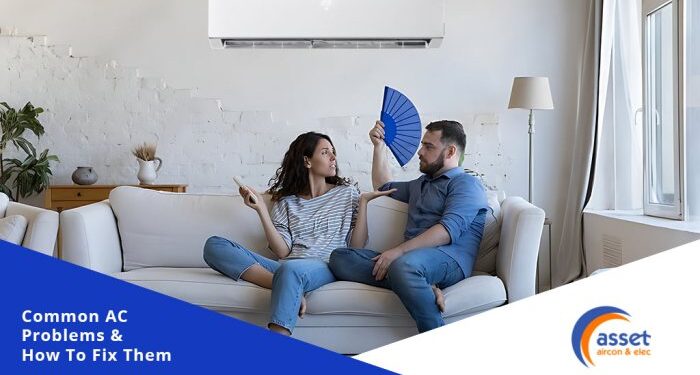Exploring the realm of common air conditioner problems and how to fix them, this guide aims to shed light on the issues that often plague these devices. From frozen units to pesky leaks, we delve into the troubleshooting steps and solutions that can help you keep your air conditioner running smoothly.
Common air conditioner problems

Air conditioners can encounter various issues that can affect their performance and efficiency. Understanding these common problems, their causes, and warning signs can help in timely maintenance and repair to ensure the smooth operation of your air conditioner.
1. Refrigerant Leaks
Refrigerant leaks are a common problem that can lead to reduced cooling capacity and higher energy bills. The potential causes behind these leaks include corrosion, faulty connections, or manufacturing defects. Warning signs of a refrigerant leak may include reduced cooling performance, hissing or bubbling sounds, or ice buildup on the refrigerant lines.
2. Dirty Air Filters
Dirty air filters can restrict airflow, reducing the efficiency of the air conditioner and causing strain on the system. The common causes of dirty air filters include lack of regular maintenance or improper filter installation. Warning signs of dirty air filters include decreased airflow, increased energy consumption, and poor indoor air quality.
3. Electrical Issues
Electrical problems such as faulty wiring, capacitor issues, or sensor malfunctions can disrupt the operation of the air conditioner. These issues can impact the overall performance of the unit and may even lead to complete system failure. Warning signs of electrical issues include frequent tripping of circuit breakers, strange odors, or unresponsive controls.
4. Frozen Evaporator Coils
Frozen evaporator coils can result from restricted airflow, low refrigerant levels, or dirty coils. This problem can prevent the air conditioner from effectively cooling the air and may cause the system to shut down. Warning signs of frozen evaporator coils include warm air blowing from the vents, ice buildup on the coils, or water leaks around the unit.
5. Fan Problems
Issues with the fan, such as a malfunctioning motor or broken blades, can disrupt the airflow and cooling process of the air conditioner. The causes of fan problems may include wear and tear, lack of lubrication, or electrical issues. Warning signs of fan problems include loud or unusual noises, poor airflow, or the air conditioner not turning on.
How to fix a frozen air conditioner
When an air conditioner freezes up, it can be a frustrating and inconvenient problem to deal with. Frozen air conditioners are usually caused by restricted airflow or low refrigerant levels. In order to address this issue effectively, it is important to follow specific steps to troubleshoot and fix the problem.
Steps to Take When an Air Conditioner Freezes Up
- Turn off the air conditioner: The first step is to turn off the AC unit to prevent further damage.
- Check for airflow restrictions: Make sure that there are no obstructions blocking the airflow from the vents.
- Allow the unit to defrost: Let the air conditioner thaw out completely before attempting to turn it back on.
- Inspect the refrigerant levels: Low refrigerant levels can also cause the unit to freeze up, so it's important to check for any leaks or issues.
- Clean or replace air filters: Dirty air filters can restrict airflow and lead to freezing, so cleaning or replacing them can help prevent this issue.
Why Air Conditioners Freeze and How to Prevent This Issue
Air conditioners freeze up due to restricted airflow, low refrigerant levels, or a malfunctioning thermostat. To prevent this issue, it is important to:
- Maintain proper airflow: Keep vents unobstructed and ensure air filters are clean.
- Regularly check refrigerant levels: Schedule routine maintenance to check and top up refrigerant levels as needed.
- Set the thermostat correctly: Avoid setting the thermostat too low, as this can cause the unit to work harder and potentially freeze up.
The Importance of Regular Maintenance in Avoiding a Frozen Air Conditioner
Regular maintenance is crucial in preventing a frozen air conditioner. By scheduling annual maintenance checks with a professional HVAC technician, you can:
- Ensure proper refrigerant levels.
- Clean and replace air filters as needed.
- Identify and address any potential issues before they lead to a frozen unit.
Tips on Troubleshooting a Frozen Unit
- Check for airflow restrictions and clear any obstructions.
- Inspect refrigerant levels and look for signs of leaks.
- Clean or replace air filters regularly to maintain proper airflow.
- Adjust thermostat settings to prevent the unit from working too hard.
Dealing with air conditioner leaks
Air conditioner leaks can be a common issue that homeowners face, leading to a variety of problems if left unattended. Identifying the source of the leak, understanding the risks associated with refrigerant leaks, and knowing how to address the issue are crucial steps in maintaining the efficiency of your air conditioning system.
Possible sources of leaks in an air conditioning system
- Corrosion in the coils
- Loose fittings or connections
- Damaged or worn-out seals
- Clogged condensate drain line
Risks associated with refrigerant leaks
- Decreased cooling efficiency
- Potential damage to the compressor
- Poor indoor air quality
- Environmental impact due to refrigerant release
Locating and fixing a leak in an air conditioner
It is essential to first turn off the air conditioner and consult a professional to safely handle refrigerant leaks.
- Inspect the unit for visible signs of leaks
- Use a leak detection kit to pinpoint the source
- Repair or replace damaged components
- Recharge the refrigerant if necessary
DIY solutions for minor leaks and when to seek professional help
- Seal minor leaks with epoxy or duct tape temporarily
- Clean the condensate drain line regularly to prevent clogs
- Monitor the system for recurring leaks and unusual noises
- Seek professional assistance for complex repairs and refrigerant handling
Troubleshooting air conditioner not cooling

When your air conditioner is not cooling properly, it can be frustrating, especially during hot summer days. Understanding the common issues that may cause this problem and how to troubleshoot them can help you get your AC back to optimal performance.
The Role of Air Filters, Coils, and Refrigerant Levels
Proper maintenance of air filters, coils, and refrigerant levels is crucial for the efficient cooling operation of your air conditioner. Here's why:
- Air Filters: Dirty or clogged air filters can restrict airflow, causing your AC to work harder to cool the air. Regularly cleaning or replacing air filters can improve cooling efficiency.
- Coils: Over time, evaporator and condenser coils can accumulate dirt and debris, reducing their ability to absorb and release heat. Cleaning the coils can enhance the cooling capacity of your air conditioner.
- Refrigerant Levels: Low refrigerant levels can indicate a leak in the system, affecting the cooling performance. It's essential to have a professional HVAC technician inspect and recharge refrigerant levels if needed.
Cleaning or Replacing Components
If your air conditioner is not cooling properly, you may need to clean or replace certain components to restore its efficiency:
- Condenser Unit: Remove any debris or vegetation around the outdoor condenser unit to ensure proper airflow and heat exchange.
- Fan Blades: Check the fan blades for any dirt or damage and clean them if necessary to maintain airflow.
- Thermostat: Ensure the thermostat is properly set to the desired temperature and functioning correctly to regulate cooling cycles.
Tips for Maintaining Optimal Cooling Performance
To prevent future cooling issues and maintain optimal performance of your air conditioner, consider the following tips:
- Regular Maintenance: Schedule annual maintenance checks with a professional HVAC technician to inspect and tune up your air conditioner.
- Keep Surroundings Clear: Maintain a clear space around the outdoor unit to allow for proper airflow and heat exchange.
- Monitor Performance: Pay attention to any changes in cooling performance, such as uneven cooling or unusual noises, and address them promptly.
Closing Summary
In conclusion, understanding the common problems faced by air conditioners and knowing how to address them is crucial for maintaining optimal performance. By following the tips and solutions Artikeld in this guide, you can ensure that your cooling system remains in top condition, keeping you comfortable in any weather.
Q&A
How often should I replace my air filters?
It is recommended to replace air filters every 1-3 months to ensure proper airflow and efficiency.
What are common signs of a refrigerant leak?
Common signs include hissing sounds, warm air blowing from vents, and ice buildup on the refrigerant lines.
Can I fix a refrigerant leak myself?
For safety reasons, it is best to leave refrigerant leak repairs to professional HVAC technicians.















